- whatcost.co.uk
- Driveway
- Driveway Cost
- Driveway Renovation Cost
How Much Does Driveway Renovation Cost?

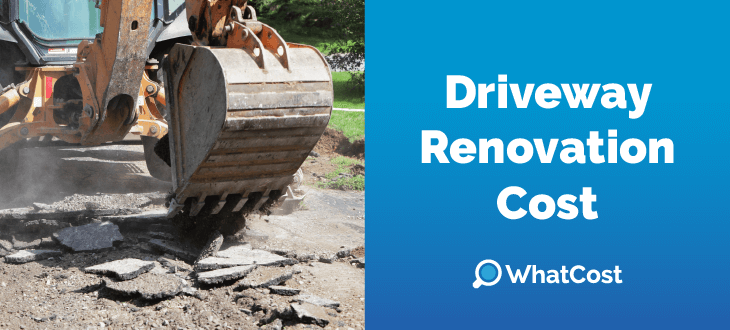
- The cost of installing a 30m² 2-car driveway falls within the range of £6,000 to £6,700.
- Severely damaged driveways cannot be paved over with new material, which means the old driveway needs to be removed. This can cost £1,500 to £2,000.
- Driveway repair costs vary based on factors such as damage extent, driveway size, materials used, accessibility, and weather conditions.
- Resurfacing a driveway can cost between £40 to £100 per m2, depending on the size of the driveway, the materials used, and the job's complexity.
Renovating your driveway can benefit both you and your home in various ways. It can increase your home's curb appeal and functionality and even raise its value by 5 to 10%, according to Checkatrade.
Additionally, it can enhance your home's security and safety and provide better accessibility. Understanding the costs is crucial to ensuring you plan effectively for this important home improvement project.
This article will guide you through the key factors that affect driveway renovation costs, including replacement, resurfacing, repairs, labour and materials. We will cover all the necessary aspects you need to be aware of so that you can make an informed decision.
While we can offer estimates and general costs, if you want to renovate your driveway as soon as possible and obtain exact costs, working with a driveway specialist who can work within your budget and plan for your needs is essential.
However, we understand that sourcing the right installer can be time-consuming. That's where WhatCost comes in! We can help you find the best deal and installer that suits your needs and preferences.
Fill out our 30-second form, and we'll provide four free quotes from local trusted driveway installers. Don't wait any longer; click below to learn more!
- Describe your needs
- Get free quotes
- Choose the best offer
It only takes 30 seconds

How much does driveway renovation cost?
The cost of a new driveway in the UK varies between £6,150 and £17,500, depending on the property size, driveway type, and materials used.
Below are the costs of driveway renovations per materials and driveway size:
| Driveway materials | 2 car driveway (30m2) |
|---|---|
| Tarmac or asphalt | £1,200- £2,100 |
| Concrete block paving | £600-£1,800 |
| Flat poured concrete | £540-£750 |
| Gravel | £1,050- £1,650 |
| Resin | £1,800-£3,000 |
| Bricks | £1,200- £1,800 |
| Indian sandstone | £1,860- £3,150 |
| Cobblestone | £600 -£2,100 |
| Driveway materials | 3 to 4 car driveways (60m2) |
|---|---|
| Tarmac or asphalt | £2,400-£4,200 |
| Concrete block paving | £1,200-£3,600 |
| Flat poured concrete | £1,080-£1,500 |
| Gravel | £2,100-£3,300 |
| Resin | £3,600-£6,000 |
| Bricks | £3,600- £6,300 |
| Indian sandstone | £1,200-£3,000 |
| Cobblestone | £1,200-£4,200 |
| Driveway materials | 4 to 6 car driveways (90m2) |
|---|---|
| Tarmac or asphalt | £3,600-£6,300 |
| Concrete block paving | £1,800-£5,400 |
| Flat poured concrete | £1,620-£2,250 |
| Gravel | £3,150-£4,950 |
| Resin | £5,400-£9,000 |
| Bricks | £5,400-£9,450 |
| Indian sandstone | £1,800-£4,500 |
| Cobblestone | £1,800-£6,300 |
It's important to remember that the costs mentioned above only cover the materials required for the renovation.
Although some high-quality materials may seem affordable initially, it's crucial to consider that more intricate designs, like patterns, can result in a more prolonged labour time, leading to increased labour costs.
When refurbishing your driveway, it's recommended that you use long-lasting and durable materials. Before making a decision, evaluate the pros and cons of different driveway types, their lifespan, and maintenance needs.
Although low-maintenance, sturdy materials may require a higher initial investment, they can save you money in the long run.
What factors affect driveway repair costs?
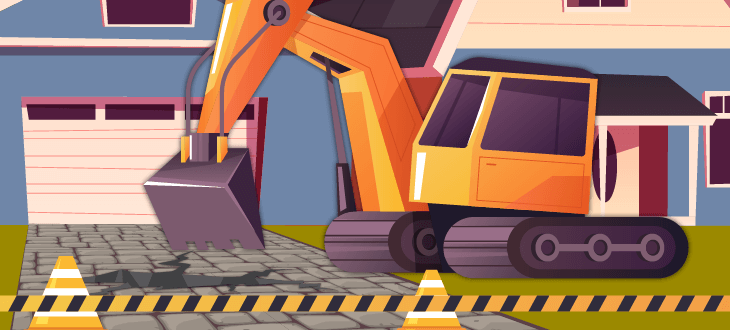
Repairing or replacing your driveway can be a tough decision. You may find yourself weighing the pros and cons of each option, trying to determine whether repairing it is worth the cost or if getting a new driveway is a better investment.
Before making a decision, it's important to consider several factors that can affect the cost of driveway repair. These factors include
- The extent of damage: The severity and extent of the damage, such as cracks, potholes, or surface erosion, will dictate the necessary repairs and materials.
- Driveway material: Different materials, such as concrete, asphalt, gravel, or paving stones, require varying repair techniques and materials, each with associated costs.
- Size of the driveway: The square footage of your driveway directly impacts the amount of labour and materials required for repairs, which in turn influences the overall cost.
- Accessibility: Accessibility to the site, including terrain, existing landscaping, and proximity to utilities, can affect the ease of repair and may impact costs if additional equipment or labour is needed.
- Underlying issues: Addressing underlying issues such as poor drainage, soil instability, or tree roots can be necessary to prevent future damage and ensure the longevity of the repair.
- Seasonal considerations: Weather conditions and seasonal factors can affect the timing and feasibility of driveway repairs, particularly for materials like asphalt that require specific temperature ranges for proper installation and curing.
Considering these factors when planning driveway repairs will help ensure a successful outcome that meets your needs and budget while addressing any underlying issues to prevent future damage.
Driveway replacement cost
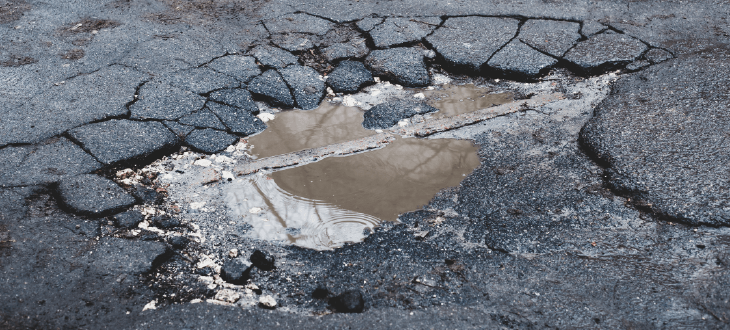
The cost of replacing your driveway includes both the removal of your old driveway and the installation of a new driveway material. Removing your old driveway involves labour costs, including machinery and skips.
If you plan to replace your driveway, you must consider the removal costs. According to Refurbb, the average cost of removing an old driveway is between £1,500 and £2,000, which includes breaking it up and taking away the old driveway.
However, if your driveway doesn't require a complete replacement, you can save much money. Below, we highlight the key signs that indicate that your driveway needs to be replaced.
- Cracks: If your driveway has multiple deep cracks that cannot be repaired, then it is time to replace the driveway.
- Potholes: Potholes clearly indicate that your driveway needs replacement. Deep potholes can cause extensive damage to your car and even become a tripping hazard.
- Poor drainage: If you notice a large pool of water on your driveway after rainfall, it is a sign that your driveway has poor drainage. This is not only damaging to the environment but can also increase the likelihood of flooding around your home, which can damage your property.
- Faded colouring: While not damaging to your property or cars, faded or worn-out-looking driveways can decrease your property's curb appeal.
Removing driveways is an easy task, especially when it comes to certain materials such as concrete, which often results in higher replacement costs. For your reference, below are the average costs of driveway removal for some of the most common driveway materials in the UK:
| Driveway material | Average removal cost |
|---|---|
| Asphalt | £400 to £700 |
| Concrete | £500 to £1,500 |
| Gravel | £150 to £250 |
| Resin | £150 to £450 |
| Block-paving | £600 |
Once your old driveway has been removed, you must consider the costs involved in replacing it with a new driveway material.
Driveway Installation costs
Typically, it will cost around £6,000 to £6,700 to install a new driveway in an area that can hold two cars of 30m2. However, driveway installation costs will increase depending on several factors, such as:
- Driveway Material: The type of material you choose for your driveway, such as concrete, asphalt, gravel, or paving stones, will significantly impact the installation cost. Each material has its own associated material and labour costs.
- Driveway Size: The size of the driveway, measured in square footage, directly affects the amount of material and labour required for installation. Larger driveways will naturally incur higher costs compared to smaller ones.
- Site Preparation: The condition of the site and any necessary preparation work, such as excavation, grading, or removal of existing structures, can influence installation costs. Sites with poor soil conditions or significant grading requirements may require more extensive preparation, adding to the overall cost. On average, site preparation costs around £15 to £20 per m2.
- Accessibility: Factors such as the accessibility of the site, terrain, existing landscaping, and proximity to utilities can impact the ease of installation and may require additional equipment or labour, affecting the overall cost.
- Design Complexity: The driveway's design complexity, including features such as curves, slopes, decorative elements, or integrated drainage systems, can increase the labour and material costs associated with installation.
The total cost of installing a driveway and removing the existing one can range between £7,500 and £8,700.
To make the project more economical, you can choose a cheaper material for your driveway. Gravel is the cheapest driveway material available, as it is easy to install and widely available.
If you decide to undertake this task yourself, it's essential to keep in mind that you will need to incur additional expenses for equipment such as a skip, demolition hammer, and a mini-digger. Here are some of the costs involved in doing this aspect of driveway installation on your own:
- Skip hire: £105 to £305 per week; costs depend on the size of the skip chosen.
- Demolition hammer: £20 to £40 per day
- Mini-digger: £270 per day
Although it is possible to remove and install a driveway by yourself, there is a risk of not doing it correctly, which can cause significant damage and expensive repairs later on. That's why it's best to hire a reputable driveway installer to ensure a proper installation.
Driveway resurfacing cost
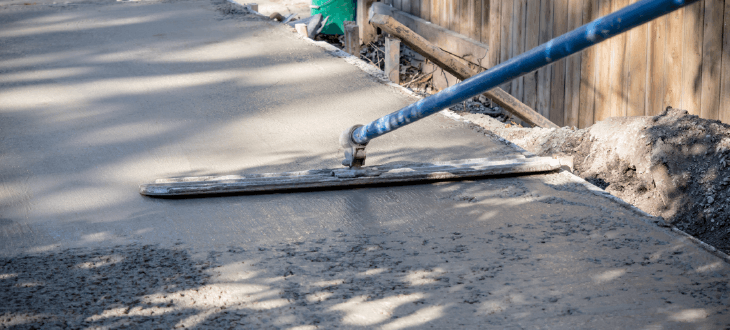
Driveway resurfacing costs in the UK can vary significantly depending on several factors such as the driveway's size, materials used, and the complexity of the job.
The benefit of driveway resurfacing is that instead of replacing the entire driveway, you can resurface or pave over it, saving you time and money on labour costs and making it a worthwhile investment.
On average, driveway resurfacing can cost anywhere from £40 to £100 per square meter, according to CheckaTrade.
The type of material selected for resurfacing also plays a crucial role in determining the overall cost. Options range from basic asphalt to more expensive choices like concrete or block paving.
The cheapest way to resurface a driveway is using gravel, but this is only feasible if your previous driveway is made from gravel.
Other options, such as resin can be used on most driveways, including concrete, asphalt, or tarmac. While more expensive than gravel, it is one of the more flexible materials to resurface with. Keep this in mind when choosing a driveway resurfacing material.
Moreover, factors such as site preparation, drainage requirements, and any necessary repairs can further influence the final price.
It's essential to note that if your old driveway is severely damaged, it may be impossible to overlay it with a new material. If you resurface an extensively damaged driveway, issues such as cracks, potholes, and sinking can occur quickly.
Driveway renovation labour costs
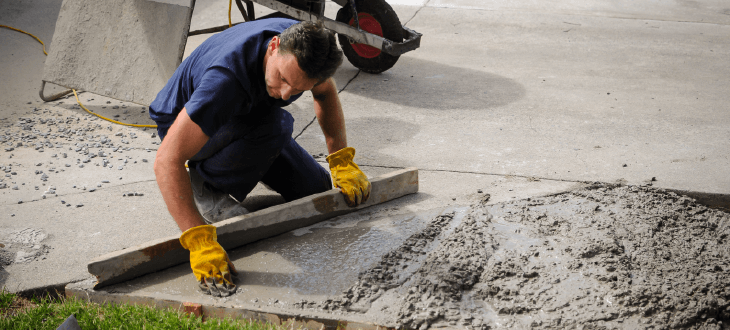
According to the Guild of Master Crafts Men, labour costs for renovating your driveway make up 80% of the total cost, with only 20% of the cost being allocated towards supplies. Therefore, it's essential to consider these costs when creating a budget for your driveway renovation project.
Driveway specialists typically charge a daily rate instead of an hourly rate. You can expect to pay between £150 and £200 per person per day.
The cost of labour increases with the extent of work required to renovate, replace, or repair your driveway. This includes the complexity of the design and the amount of groundwork and excavation work needed. The more time spent on a driveway renovation, the more labour costs will increase.
How to find a reputable driveway repair installer
You must research if you're looking for a professional driveway specialist who will provide you with top-notch workmanship and reliable service.
Start by asking your friends, family, and neighbours for recommendations, and check out online reviews and ratings to get a better sense of a contractor's reputation and trustworthiness.
Once you've narrowed down your list, request quotes from multiple contractors and take the time to review their credentials, including their licenses, certifications, and insurance coverage.
It's also crucial to ask for references and examples of their previous work to ensure they can deliver the work you're looking for.
When making your final decision, consider the materials' long-term durability and aesthetic appeal.
All this can be a hassle and time-consuming, but don't worry! WhatCost has you covered.
Our 30-second form will get you four free quotes from trusted local driveway specialists tailored to your needs and preferences. Save time - take advantage of this convenient and accessible service today!
- Describe your needs
- Get free quotes
- Choose the best offer
It only takes 30 seconds

FAQ
The cost of driveway restoration ranges from £40 to £100 per m2, depending on the size of the driveway and the chosen material.
One of the most affordable ways to resurface a driveway is to utilise gravel, which is easy to install and available. However, if you have an old driveway made of asphalt or tarmac, there may be more suitable options than using gravel. Gravel can be used to resurface older gravel driveways to give them a renewed appearance.
The cost of a new driveway in the UK can range from £6,150 to £17,500, depending on the property size, driveway type, and materials used.
Yes, it is worth resurfacing your driveway. Resurfacing allows for an update without the need for a complete replacement, saving labour costs.

Caoimhe is an experienced content writer and researcher who is passionate about providing accessible information to every reader. With a background in English literature and Sociology, she combines the two disciplines to create cohesive, well-thought-out, and well-informed pieces.
